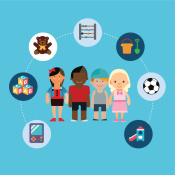Critical Information
The number of children ages 3 to 17 struggling with anxiety or depression rose by 1.5 million between 2016 and 2020. Educators trained in resilience will fortify their students and raise their potential for learning.
Two modes for promoting student resilience
Synchronous solutions…
include facilitated small group discussion, coaching, workshops, and more. Our unique web events include live group therapy, humor workshops to infuse fun into the classroom and even live events with comedians. Enjoy the video example.
Asynchronous solutions…
include on-demand video engagements on a range of topics from autism to dealing with difficult students. Faculty (and parents) can learn the rubric for developing greater resilience, will pass along this learning to students. Please enjoy this video montage on student engagement from our on-demand video library.
On-demand virtual engagements

Learning Disabilities Part II
Begin to deepen your appreciation of the various types of learning disabilities and how to identify them. Experience the life of a 10-year-old 'Sky' with continued interview footage.

Managing Anger Outbursts from Elderly Residents Part I
When elderly residents become angry, it's often difficult to know if this is dementia, impulsivity, or a healthy expressio of feelings.

Managing Anger Outbursts in Elderly Residents Part II
In the second part of this series, take a deeper dive into the techniques and strategies for addressing elderly residents who are angry.

Master Dealing with Difficult Families Part I
Difficult families can be one of the biggest hindrances on a student's learning. Learn how to handle the many different family types you will encounter.

Master Dealing with Difficult Families Part II
There are many different types of families you will experience within your classroom. Learn about the main six types of families you will encounter.

Master Dealing with Difficult Families Part III
Difficult families may impact your work with a student or even create stress in your day. Learn simple but impactful ways to help you navigate with these families.

Master Dealing with Difficult Families Part IV
This final segment is about using our understanding of family types to employ specific strategies that will pacify without enabling. Learning five techniques and several common mistakes teachers make.

Maximizing Student Participation Part I
Improved student participation is directly correlated with achievement. Maximizing participation will reduce classroom stress and provide greater results for students.
Success Stories

"Whole School Health Through Psychosocial Emotional Learning highlights the importance of relationships, communication, and compassion for others. It presents a critical view in supporting, training, and retaining teachers through the lens of engaging and modeling behaviors that will help our rural students be better civic leaders and community members. My favorite quote from the book gives credit to the author's upbringing and modeling from his parents: 'We must experience the world through others so we can fully engage in educating all children. My father and mother modeled to me and my siblings how to experience the world through somebody else’s eyes, especially if their outer differences stirred up discomfort or displeasure, enriching all lives involved.' I recommend all leaders, teachers, and stakeholders secure their copy as they prepare for school."
Allen Pratt, Executive Director, National Rural Education Association (NREA)